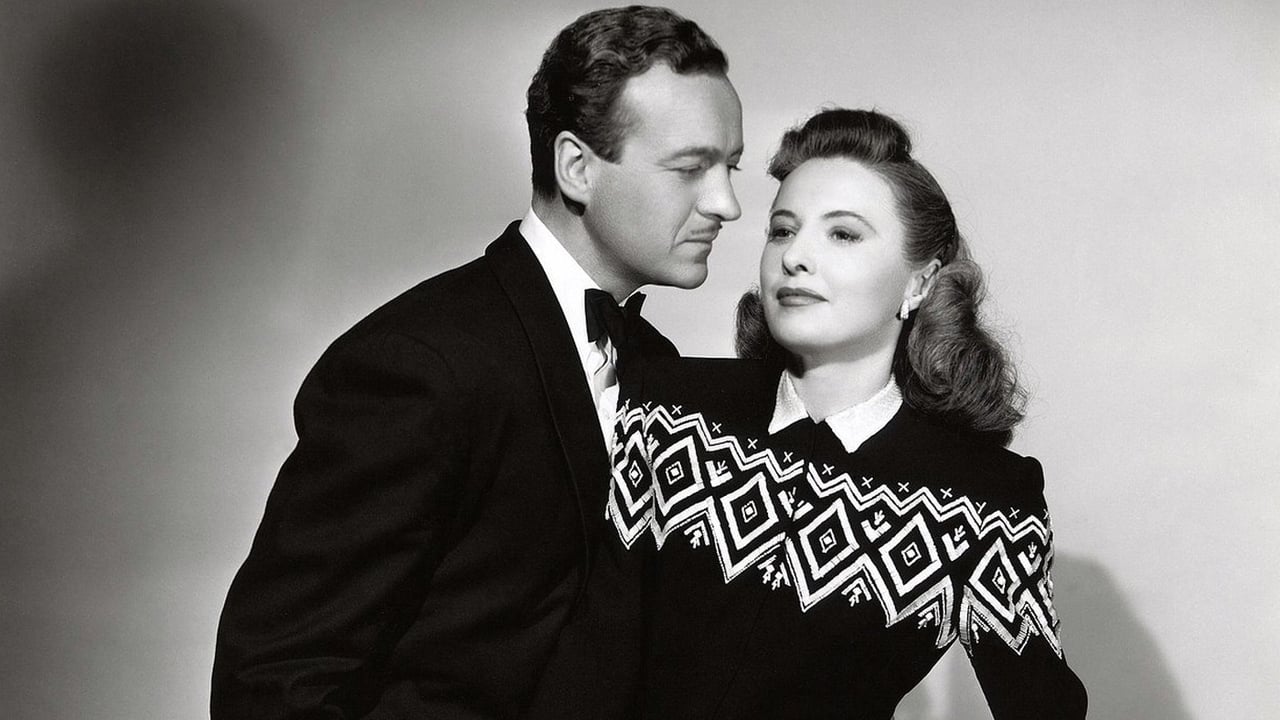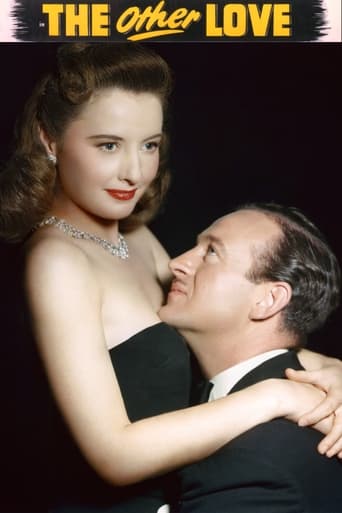



This Movie Can Only Be Described With One Word.
It's entirely possible that sending the audience out feeling lousy was intentional
View MoreThe plot isn't so bad, but the pace of storytelling is too slow which makes people bored. Certain moments are so obvious and unnecessary for the main plot. I would've fast-forwarded those moments if it was an online streaming. The ending looks like implying a sequel, not sure if this movie will get one
View MoreStrong acting helps the film overcome an uncertain premise and create characters that hold our attention absolutely.
View MoreOne of the 10 commandments of modern ethics for medical doctors is they must not become involved with their patients--taking advantage of their superior position to fan the flames of romance in the patient.Stanwyck could have won a big lawsuit in today's feminist world.That romantic angle out of it, this movie takes a lot of material from Magic Mountain by Thomas Mann. From the importance of the thermometers to the patients disappearing at night (dead down the service elevator).As some other reviewer stated Stanwyck can turn any role into something watchable....this silly movie taxed her talents to the limit.Is she going to die??? I am not sure that was a given as others stated... but after all the silly iconic fluff of Monte Carlo and race car drivers you really don't care.Not a memorable performance.It gets a 5
View MoreIn The Other Love Barbara Stanwyck turns in her standard praiseworthy desperate woman performance while director Andre DeToth's lackluster direction makes it a challenge to get through. Lacking pace and energy the film moves slowly and predictably from one anguished moment to the next with dull results.Concert pianist Susan Duncan is forced to seek treatment for life threatening TB in a Swiss Sanitarium. There she finds herself falling in love with caregiver Dr. Anthony Stanton (David Niven) as well as be frustrated with her treatment. When she feels Stanton has little interest in her she takes up with Paul Clermont Richard Conti) a race car driver, running down her health as she does. Stanton tries to prevent her from self destruction but also reveals his love for her as well. Will it be enough to save Sue? As post war melodramas go The Other Love is a little dated in story and style. Niven's Stanton is a little too retiring and poorly cast. The chemistry just doesn't work and their big emotional scenes together are without passion and desire. Conti's race car driver fares better, but it is Gilbert Roland in one scene with Stanwyck that gives the film its most powerful moment as he coldly exploits her in a highly vulnerable situation.Even with Stanwyck delivering the goods, The Other Love is one dull weeper.
View MoreWomen's films, as they were called in the '40s, seldom offered a star a more glamorous way of leaving this world than THE OTHER LOVE, with BARBARA STANWYCK checking herself into a Swiss sanitarium to be treated for tuberculosis and promptly falling in love with her young doctor, David NIVEN against a background of Alpine beauty.Stanwyck has got to be the healthiest patient in Hollywood history and she gets even more glamorous as she moves toward impending doom. So does the music by Miklos Rozsa. And as if one leading man isn't enough, the script has her leaving the safety (and boredom) of the clinic to go chasing after a tough motorcyclist (RICHARD CONTE) for one last fling.It's syrupy romance straight from the pages of a Cosmopolitan magazine story--but no, in this case, straight from the pages of a novel by Erich Maria Remarque, who gave the world ALL QUIET ON THE WESTERN FRONT, but also turkeys like ARCH OF TRIUMPH.Stanwyck's fans will be too busy admiring her wardrobe to view the plot with any skepticism at all, but others might find it just a little too pat and contrived, even for this genre of pulp romance.
View MoreI was actually pretty much impressed by this story -- with its clever prefiguring, scenes of idyllic beauty, happiness, and jarring chills as abrupt as any horror movie, its music and raging against the dying of the light -- right up until it hits the last few scenes, which somehow strike a false note. Perhaps it's because my sympathies have a tendency, whether in sob-stories like this or in fluff as light-hearted as 'An American in Paris', to veer towards those third parties whose own affections serve only as a momentary derailment to the course of True Love. Perhaps it's my own experience of watching such illness play out its rapacious course, and knowledge of the futile health myths of the era. But after the touch of ice that runs through the rest of the film, the grand finale strikes me as a cop-out.From a medical point of view it does occur to me to wonder how many modern viewers will realise from the start what's supposed to be going on! The dread opening words 'Swiss sanitarium' are no longer a universally-recognised shorthand for the unnamed spectre of tuberculosis, the cancer equivalent for sentimental sagas of the era. But it is, of course, tuberculosis requiring all those chest X-rays, mountain air, and 'stimulating diet'...The story is skilfully constructed along the lines of a murder-mystery, lulling the viewer into security for long stretches of time, arousing sympathy and indignacy at a regime that can deprive Karen of her music as well as her liberty and her mobility. Celestine's constant light malice on the subject of Dr Tony -- jealousy or realistic view? -- stirs up additional doubt, and her role turns out to have a much greater significance than we were led to believe. Questions of truth or lies run like a twisting theme throughout the greater part of the film, keeping the audience off-balance, and making Karen's ultimate reaction of discovery easier to comprehend. (Again, though, I do wonder if modern viewers will realise that in medicine of the period, deceiving patients for their own good was no misdemeanour but more or less expected!)By and large, I found this film much more sophisticated than one might expect from a genre piece of this nature. I've already mentioned the elements that verge unexpectedly on horror amid the sweetness, and the innocent establishment beforehand of items that will later prove significant. Celestine is not what she may appear. And Clermont, too, is not the opportunistic cad first appearances might lead us to assume.My main problem is that it seems to turn a corner into a quite different sort of film in the last few minutes, for no very convincing reason. Given its previous record in this line, I was anticipating some kind of apocalyptic revelation right up until the final shot... and was left still hanging there, waiting, when the film proved merely to have ended. It felt like a simplistic resolution to what had previously proved a complex structure. And, I think, it turns the story into one about the heroine learning her lesson rather than one about her fierce passion for life -- and thus, for me, making her a less appealing character. Despite everything, the cruise might have been the better option...
View More